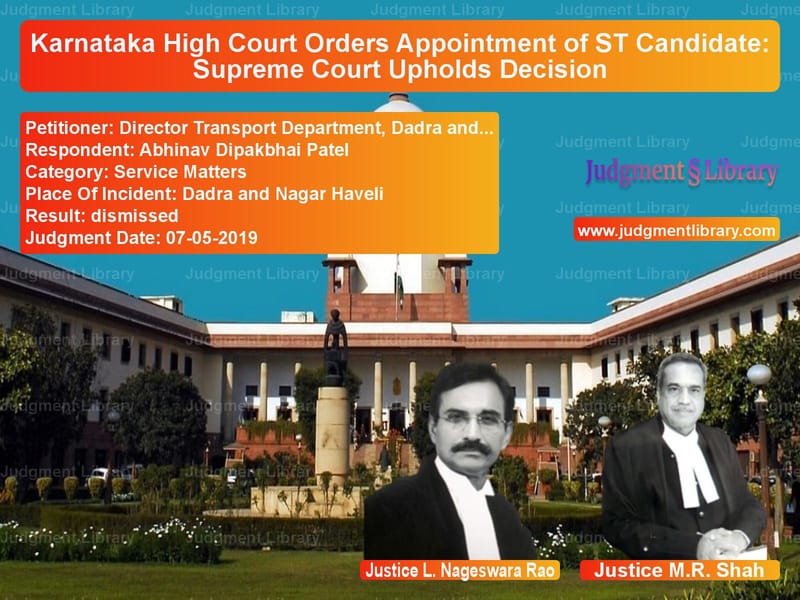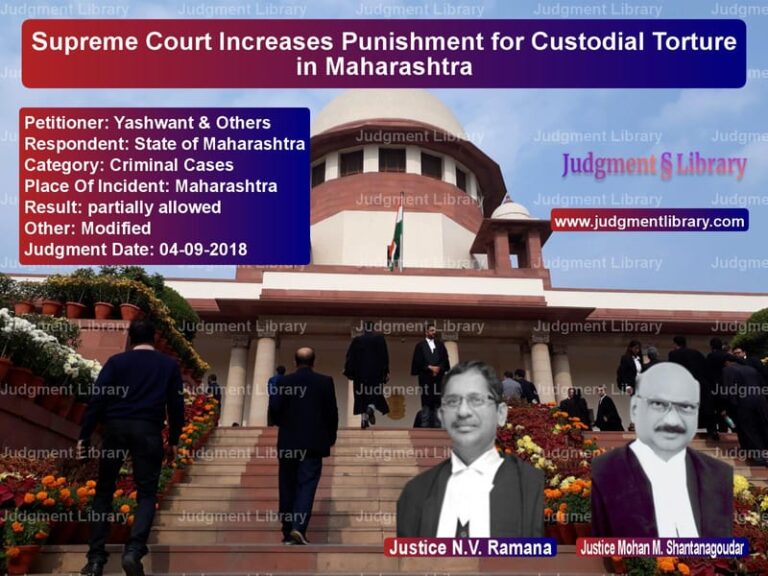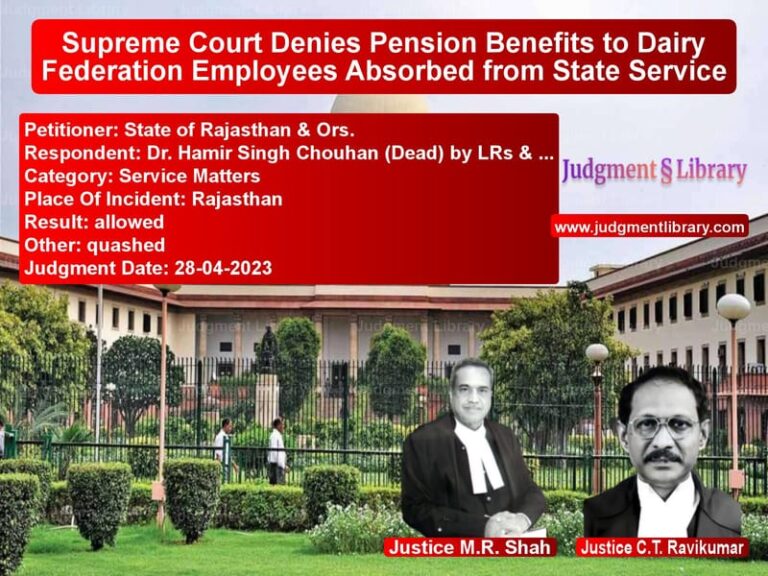Karnataka High Court Orders Appointment of ST Candidate: Supreme Court Upholds Decision
The case of Director Transport Department, Union Territory of Dadra and Nagar Haveli vs. Abhinav Dipakbhai Patel concerns a significant legal question on the eligibility of Scheduled Tribe (ST) candidates migrating from one state to a Union Territory. The respondent, Abhinav Dipakbhai Patel, was denied appointment as an Assistant Motor Vehicle Inspector in Dadra and Nagar Haveli despite being the highest-scoring candidate in the Scheduled Tribe category. The dispute arose over whether a Scheduled Tribe certificate from Gujarat was valid for reservation benefits in the Union Territory.
Background of the Case
Abhinav Dipakbhai Patel belonged to the ‘Dhodia’ caste, recognized as an ST in both Gujarat and Dadra and Nagar Haveli. He had moved from Gujarat to the Union Territory and had a residential property, a voter ID, and other documents proving his residence. When an advertisement was issued on October 25, 2014, inviting applications for two Assistant Motor Vehicle Inspector posts—one reserved for ST candidates—he applied and appeared for the written examination.
Despite scoring the highest marks among ST candidates, the results for the reserved category were not announced. Upon inquiry, he learned that his candidacy was being questioned because his Scheduled Tribe certificate was issued in Gujarat, not Dadra and Nagar Haveli. After repeated representations to the transport department, he approached the National Commission for Scheduled Tribes (NCST), which directed his appointment. However, the administration did not comply, leading Patel to file a writ petition in the Karnataka High Court.
Key Legal Issues
- Whether a Scheduled Tribe candidate from one state can claim reservation in a Union Territory.
- Whether Patel was wrongly denied appointment despite clear eligibility.
- The constitutional and legal framework governing reservation benefits in Union Territories.
Arguments Presented
Petitioner (Director Transport Department, Dadra and Nagar Haveli):
- Reservation benefits are only available to ST candidates originally domiciled in Dadra and Nagar Haveli.
- The recruitment policy, framed in 2006 and modified in 2013, stated that only local candidates could avail of reservation benefits.
- Granting Patel reservation benefits would violate the principle that reservation is based on geographical and social conditions unique to each region.
Respondent (Abhinav Dipakbhai Patel):
- He was a resident of Dadra and Nagar Haveli, as evidenced by his voter ID and property ownership.
- The recruitment advertisement permitted all Indian citizens to apply, indicating that non-local candidates were eligible.
- The National Commission for Scheduled Tribes and the Ministry of Home Affairs confirmed his eligibility.
- There was no explicit exclusion of non-local ST candidates in the recruitment process.
High Court Ruling
The Karnataka High Court ruled in favor of Patel, ordering his appointment with retrospective effect. The court emphasized:
- Reservation benefits in a Union Territory differ from those in states, as Union Territories are centrally administered.
- The recruitment advertisement did not restrict reservation benefits to local candidates.
- Patel’s case was backed by government authorities, yet the administration arbitrarily denied him the job.
Supreme Court’s Observations and Judgment
The Supreme Court upheld the High Court’s decision, ruling that Patel was unfairly denied his rightful appointment. The Court noted:
- “The advertisement for the recruitment did not exclude non-local ST candidates, and no policy was placed on record explicitly barring their selection.”
- “The National Commission for Scheduled Tribes and the Ministry of Home Affairs had both clarified Patel’s eligibility, yet the administration ignored their directives.”
- “The reservation policy in Union Territories cannot be equated with state-specific policies, and undue restrictions should not be placed without a clear legal basis.”
The Supreme Court dismissed the appeal and directed the transport department to immediately appoint Patel with all consequential benefits.
Legal Implications of the Judgment
This ruling sets a precedent on how reservation benefits apply in Union Territories:
- Union Territories, being under central administration, cannot impose state-specific domicile conditions unless expressly mandated by law.
- When recruitment policies do not specify domicile restrictions, selection committees cannot arbitrarily reject candidates.
- Government agencies must adhere to directions from constitutional bodies like the National Commission for Scheduled Tribes.
Conclusion
The Supreme Court’s decision in this case upholds the principles of fairness and equal opportunity in government employment. By rejecting arbitrary restrictions on reservation benefits, the ruling ensures that eligible candidates are not denied their rightful place in public service. This judgment reaffirms that constitutional guarantees for Scheduled Tribes extend to Union Territories without unnecessary administrative roadblocks.
Petitioner Name: Director Transport Department, Dadra and Nagar Haveli.Respondent Name: Abhinav Dipakbhai Patel.Judgment By: Justice L. Nageswara Rao, Justice M.R. Shah.Place Of Incident: Dadra and Nagar Haveli.Judgment Date: 07-05-2019.
Don’t miss out on the full details! Download the complete judgment in PDF format below and gain valuable insights instantly!
Download Judgment: Director Transport D vs Abhinav Dipakbhai Pa Supreme Court of India Judgment Dated 07-05-2019.pdf
Direct Downlaod Judgment: Direct downlaod this Judgment
See all petitions in Employment Disputes
See all petitions in Recruitment Policies
See all petitions in Public Sector Employees
See all petitions in Judgment by L. Nageswara Rao
See all petitions in Judgment by Mukeshkumar Rasikbhai Shah
See all petitions in dismissed
See all petitions in supreme court of India judgments May 2019
See all petitions in 2019 judgments
See all posts in Service Matters Category
See all allowed petitions in Service Matters Category
See all Dismissed petitions in Service Matters Category
See all partially allowed petitions in Service Matters Category







